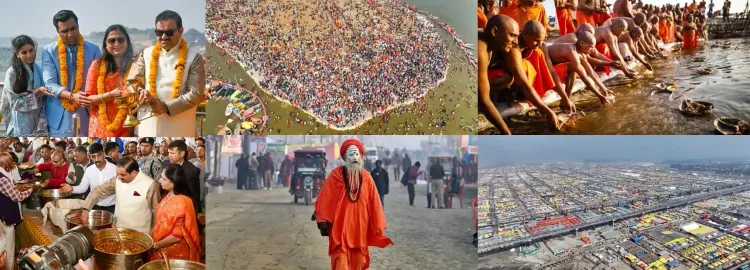Spiritual Framework: The Kumbh's Influence on India's Leadership Narrative

Synopsis
Key Takeaways
- Scale with Soul
- Sustainable Before Sustainability Became Trendy
- Leadership Through Service
- Inclusive Growth
- Spiritual Technology
New Delhi, Jan 27 (NationPress) Within the immense panorama of human assemblies, nothing rivals the Kumbh Mela. Our organization has been profoundly involved in the Mela this year, and each time I engage in conversations about it, I am deeply moved by the foresight of our ancestors. As a person who has developed ports, airports, and energy infrastructures throughout India, I am consistently amazed by this extraordinary exhibition of what I term "spiritual infrastructure" -- a force that has nourished our civilization for thousands of years.
Possibly the World's Largest Management Case Study
When Harvard Business School examined the logistics of the Kumbh Mela, they were astonished by its magnitude. However, as an Indian, I perceive something more profound: the globe's most triumphant temporary megacity transcends mere statistics -- it's about timeless principles that we at the Adani Group aspire to uphold.
Reflect on this: Every 12 years, a temporary city larger than New York arises along the banks of sacred rivers. No board meetings. No PowerPoint presentations. No venture capital. Just pure, age-old Indian jugaad (innovation) supported by centuries of accumulated wisdom.
The Three Indestructible Pillars of Kumbh Leadership
1. Scale with Soul
At the Kumbh, scale signifies more than mere size – it embodies impact. When 200 million individuals convene with devotion and service, it transforms into a distinctive convergence of souls. I refer to this as "spiritual economies of scale." The larger it becomes, the more effective it is, not only in material terms but also in regards to humanity and human connection. True scale is not quantified by metrics but by the shared moments of unity it fosters.
2. Sustainable Before Sustainability Became Trendy
Long before ESG emerged as a buzzword in corporate discussions, the Kumbh Mela was implementing circular economy principles. A river serves not merely as a water source but as the lifeblood of existence. Preserving it reflects our ancient wisdom. The same river that accommodates millions reverts to its natural state after the Kumbh, having purified hundreds of millions of devotees and confident that it can renew itself from all the "impurities" it absorbed. Perhaps there is a lesson here for our contemporary development models. Advancement, after all, is gauged not by what we extract from the earth but by how we replenish it.
3. Leadership Through Service
The most compelling aspect? The absence of a singular controlling authority. Authentic leadership is not about issuing commands but about the ability to unite everyone. Various akharas (religious groups), local governments, and volunteers collaborate seamlessly. It’s leadership rooted in service, not in dominance – a principle that modern corporations could greatly benefit from. It teaches us that exemplary leaders do not command or control – they cultivate conditions for collective collaboration and upliftment.
Service is Devotion, Service is Prayer, and Service is God
Lessons from the Kumbh for Global Business
As India strives for a $10 trillion economy, the Kumbh Mela provides invaluable insights:
1. Inclusive Growth
The Mela embraces everyone – from sadhus to CEOs, villagers to international visitors. It epitomizes what we at Adani describe as "Growth with Goodness."
2. Spiritual Technology
While we take pride in digital innovation, the Kumbh exemplifies spiritual technology -- enduring systems for managing human consciousness at scale. This soft infrastructure is as essential as physical infrastructure in today’s world where mental health threats loom large!
3. Cultural Confidence
In a time of global uniformity, the Kumbh stands as a beacon of cultural authenticity. It is not a relic -- it’s a vibrant, dynamic example of tradition adapting to contemporary needs.
Is the Future Ancient?
As I traverse our ports or solar facilities, I frequently ponder the Kumbh's teachings. Our ancient civilization did not merely erect monuments -- it crafted living systems that sustain millions. This is our aspiration for modern India -- not just constructing infrastructure, but nurturing ecosystems.
And, as nations vie for military strength and economic power, the Kumbh symbolizes India’s unique soft power. Vasudeva Kutumbukam! It’s about more than hosting the largest gathering on the planet. It’s about presenting a sustainable model of human organization that has thrived for millennia.
The Leadership Challenge
Thus, for contemporary leaders, the Kumbh raises a crucial question: Can we create organizations that endure not just for years, but for centuries? Can our frameworks accommodate not just scale, but soul? In an era of AI, climate challenges, and social disintegration, the Kumbh's insights hold more significance than ever and encompass all of the following:
⦁ Sustainable Resource Management
⦁ Harmonious Mass Collaboration
⦁ Technology with a Human Touch
⦁ Leadership Through Service
⦁ Scale Without Losing Soul
The Path Ahead
As India advances toward becoming a global powerhouse, we must remember: our strength is not solely in what we construct, but also in what we safeguard. The Kumbh is more than a religious event -- it’s a framework for a sustainable civilization. It reminds me that true scale is not reflected in financial statements, but in the positive impact on human consciousness.
In the Kumbh, we witness the essence of India's soft power -- a power not based on conquest but on awareness, not on control but on service. India’s true strength resides in its soul, where growth transcends mere economic might to become a convergence of human consciousness and service. This is the message the Kumbh imparts to us -- that enduring legacy is not found in constructed edifices but in the consciousness we foster -- which flourishes for centuries.
Consequently, the next time you reflect on India's growth narrative, recall: our most triumphant endeavor isn’t a colossal port or a renewable energy facility -- it’s a spiritual congregation that has successfully operated for centuries, serving millions without exhausting resources or losing its essence.
That is the authentic India narrative.
That is the leadership lesson our world urgently requires.
(Gautam Adani is the Chairman of the diversified Adani Group)







